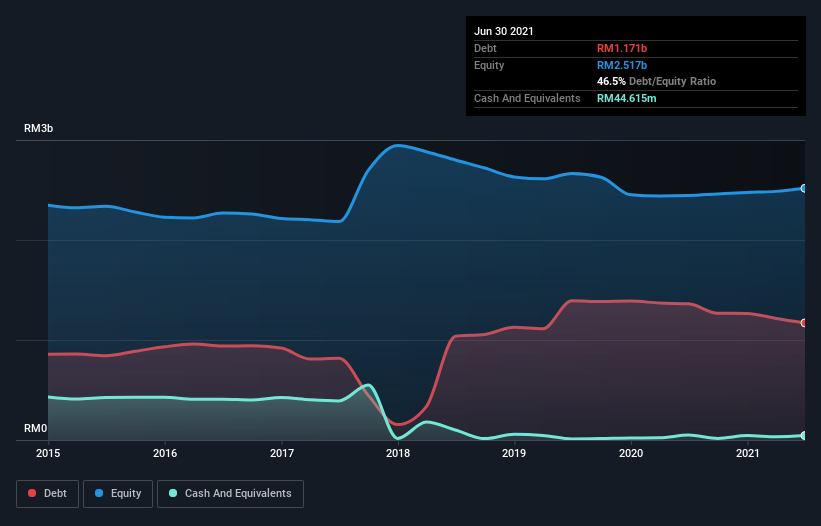These 4 Measures Indicate That Boustead Plantations Berhad (KLSE:BPLANT) Is Using Debt Reasonably Well

Some say volatility, rather than debt, is the best way to think about risk as an investor, but Warren Buffett famously said that 'Volatility is far from synonymous with risk.' When we think about how risky a company is, we always like to look at its use of debt, since debt overload can lead to ruin. As with many other companies Boustead Plantations Berhad (KLSE:BPLANT) makes use of debt. But is this debt a concern to shareholders?
Why Does Debt Bring Risk?
Generally speaking, debt only becomes a real problem when a company can't easily pay it off, either by raising capital or with its own cash flow. Part and parcel of capitalism is the process of 'creative destruction' where failed businesses are mercilessly liquidated by their bankers. While that is not too common, we often do see indebted companies permanently diluting shareholders because lenders force them to raise capital at a distressed price. Of course, plenty of companies use debt to fund growth, without any negative consequences. When we think about a company's use of debt, we first look at cash and debt together.
View our latest analysis for Boustead Plantations Berhad
What Is Boustead Plantations Berhad's Debt?
You can click the graphic below for the historical numbers, but it shows that Boustead Plantations Berhad had RM1.17b of debt in June 2021, down from RM1.36b, one year before. However, because it has a cash reserve of RM44.6m, its net debt is less, at about RM1.13b.

How Strong Is Boustead Plantations Berhad's Balance Sheet?
The latest balance sheet data shows that Boustead Plantations Berhad had liabilities of RM764.9m due within a year, and liabilities of RM826.4m falling due after that. Offsetting these obligations, it had cash of RM44.6m as well as receivables valued at RM70.0m due within 12 months. So its liabilities outweigh the sum of its cash and (near-term) receivables by RM1.48b.
When you consider that this deficiency exceeds the company's RM1.44b market capitalization, you might well be inclined to review the balance sheet intently. Hypothetically, extremely heavy dilution would be required if the company were forced to pay down its liabilities by raising capital at the current share price.
In order to size up a company's debt relative to its earnings, we calculate its net debt divided by its earnings before interest, tax, depreciation, and amortization (EBITDA) and its earnings before interest and tax (EBIT) divided by its interest expense (its interest cover). Thus we consider debt relative to earnings both with and without depreciation and amortization expenses.
Boustead Plantations Berhad has a debt to EBITDA ratio of 3.7 and its EBIT covered its interest expense 4.2 times. Taken together this implies that, while we wouldn't want to see debt levels rise, we think it can handle its current leverage. The silver lining is that Boustead Plantations Berhad grew its EBIT by 459% last year, which nourishing like the idealism of youth. If it can keep walking that path it will be in a position to shed its debt with relative ease. When analysing debt levels, the balance sheet is the obvious place to start. But it is future earnings, more than anything, that will determine Boustead Plantations Berhad's ability to maintain a healthy balance sheet going forward. So if you're focused on the future you can check out this free report showing analyst profit forecasts.
Finally, while the tax-man may adore accounting profits, lenders only accept cold hard cash. So we clearly need to look at whether that EBIT is leading to corresponding free cash flow. Over the last two years, Boustead Plantations Berhad actually produced more free cash flow than EBIT. That sort of strong cash conversion gets us as excited as the crowd when the beat drops at a Daft Punk concert.
Our View
Both Boustead Plantations Berhad's ability to to convert EBIT to free cash flow and its EBIT growth rate gave us comfort that it can handle its debt. Having said that, its level of total liabilities somewhat sensitizes us to potential future risks to the balance sheet. Considering this range of data points, we think Boustead Plantations Berhad is in a good position to manage its debt levels. Having said that, the load is sufficiently heavy that we would recommend any shareholders keep a close eye on it. When analysing debt levels, the balance sheet is the obvious place to start. However, not all investment risk resides within the balance sheet - far from it. Case in point: We've spotted 3 warning signs for Boustead Plantations Berhad you should be aware of, and 1 of them is concerning.
If, after all that, you're more interested in a fast growing company with a rock-solid balance sheet, then check out our list of net cash growth stocks without delay.
Valuation is complex, but we're here to simplify it.
Discover if Boustead Plantations Berhad might be undervalued or overvalued with our detailed analysis, featuring fair value estimates, potential risks, dividends, insider trades, and its financial condition.
Access Free AnalysisThis article by Simply Wall St is general in nature. We provide commentary based on historical data and analyst forecasts only using an unbiased methodology and our articles are not intended to be financial advice. It does not constitute a recommendation to buy or sell any stock, and does not take account of your objectives, or your financial situation. We aim to bring you long-term focused analysis driven by fundamental data. Note that our analysis may not factor in the latest price-sensitive company announcements or qualitative material. Simply Wall St has no position in any stocks mentioned.
Have feedback on this article? Concerned about the content? Get in touch with us directly. Alternatively, email editorial-team (at) simplywallst.com.
About KLSE:BPLANT
Boustead Plantations Berhad
Boustead Plantations Berhad, an investment holding company, owns, operates, and manages oil palm plantations in Malaysia.
Second-rate dividend payer with imperfect balance sheet.
Similar Companies
Market Insights
Community Narratives



